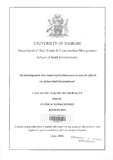Resource information
The history of land policies from the time of colonial administrators to the time of development planners and reform programmes (resettlement schemes, adjudication and demarcation for registration purposes) underscores the history of most Kenyan citizens losing their rights and access to land and its commitant benefits.
The study established that the importance of land ownership hinges on socio-economic and political considerations especially in developing countries such as Kenya. Land enables one to have security mainly in terms of access to credit. It can be utilized for both, economic and subsistence purposes. To some people, land gives power and prestige. Indeed, land ownership has been a true manifestation, of power and wealth in Kenya. This myth has been fueled by the rampant land grabbing, misallocation and other underhand dealings by those with administrative, political and economic powers.
Unfortunately, this is carried out at the expense of the weaker sections of the society in general, and in particular mainly at the expense of the poor. To make matters worse, the laws governing real property that should be employed as a solution, have been found by a section of legal experts to be archaic, outdated, retrogressive and alien. The introduction of the individual land tenure system translated into a tenure arrangement based on an indefeasible title and not use. Registration process has not given individual title holders the security and power to deal with their land.
Key components of Draft National Land Policy were examined, analyzing why, in many respects, informal systems work better than formal ones and suggesting some ways in which this might inform improvements to land administration. The main focus was on property rights (tenure, registration and titling), although use regulation, direct public participation in the land market and infrastructure provision were also of importance.


